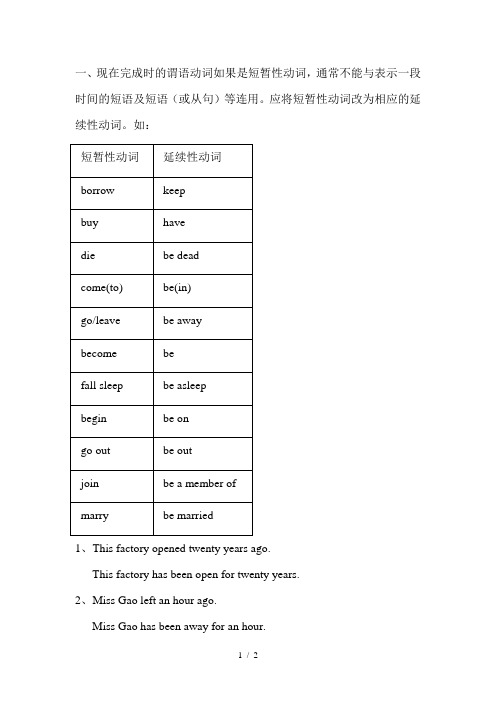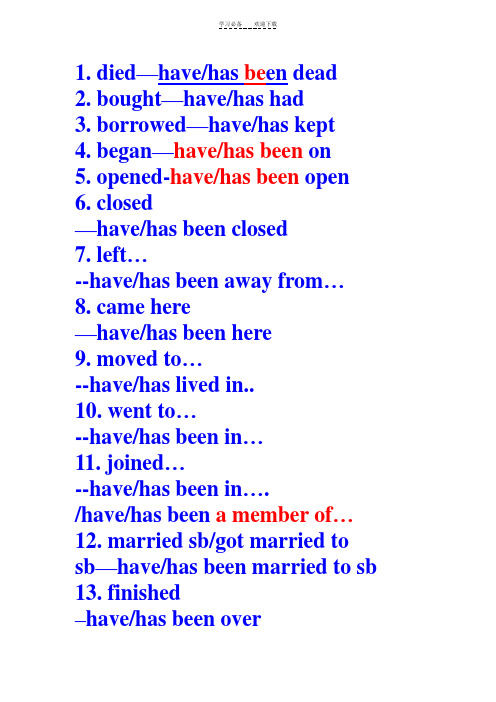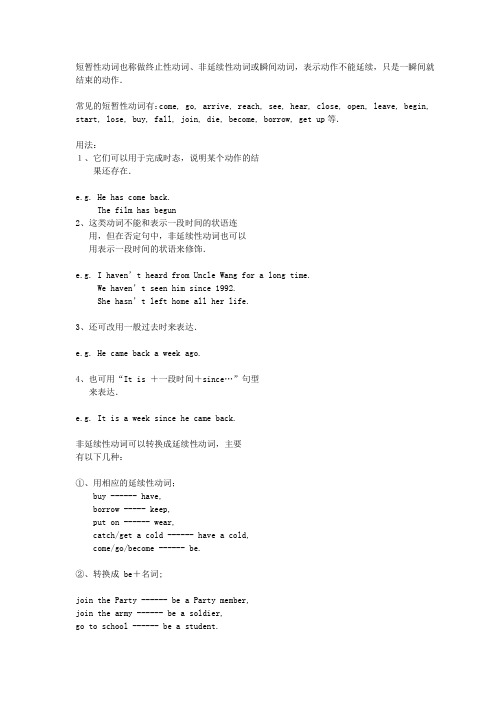短暂性动词
短暂动词和延续性动词练习题

延续性动词和短暂性动词的使用在学习现在完成时的过程中,我们经常碰到类似这样的句子:1)这辆自行车我已经买了五年了。
2)这位老人已经去世五年了。
此时,有些同学就想当然的将之翻译为:1)I have bought this bike for five years.(此句突出“买”的动作。
言下之意,到现在还没有买到。
)2)The old man has died for five years.(此句突出“死”的动作,给人的感觉是“这位老人五年期间一直在死亡线上挣扎”。
)造成这种错误的主要原因是学习者在运用动词的过程中,将瞬间动词与延续性动词混为一谈。
英语中,动词按其动作发生的方式、动作发生过程的长短,可分为延续性动词和瞬间动词。
那么,什么是瞬间动词呢?简而言之,瞬间动词也叫短暂性动词或终止性动词。
这种动词是指它们动作的开始也就意味着动作的结束,所以不能直接跟表示一段的时间状语连用。
如open, close, finish, begin, come, go, arrive, reach, get to, leave, move, borrow, buy, die等。
延续性动词表示能够延续的动作,这种动作可以延续下去或产生持久影响。
如:learn, work, stand, lie, know, walk, keep, have, wait, watch, sing, read, sleep, live, stay等。
延续性动词可以用于现在完成时,其完成时态可与表示"段时间"的状语连用。
延续性动词不能与表示短暂时间的"点时间"状语连用.It raind at eight yesterday morning.(误) rain为延续性动词,而at eight表示"点时间",前后显然矛盾。
如果用延续性动词表示一瞬间的动作,可以借助come, begin, get等终止性动词来表示。
现在完成时中短暂性动词与延续性动词的转换(共18张PPT)

谢谢观赏
You made my day!
我们,还在路上……
现在完成时中 (点动词)短暂性动词与延续性动词的转化
也称做点动词、非延续性动词或瞬间动词。
表示动作不能延续,只是一瞬间就结束的 动作。
come, go, arrive, reach, see, hear, close, open, leave, begin, start, lose, buy, fall, join, die, become,
his
grandfather
His brother borrowed the book .
His brother borrowed the book .
His brother has kept the book .
His brother has kept the book .
It’s two weeks
1. 实义动词转化成实义动词
2. 转化成be+形容词或介词
3. 转化成be+名词(词组)
His grandfather
His grandfather His grandfather
His grandfather
It five years
his grandfather
Five years
his brother
borrowed the book .
Two weeks has passed
his
brother borrowed the book .
His brother joined the army .
His brother joined the army .
His brother has been in the army .
短暂性动词和延续性动词

keep come/go /become/reach
2.转换成be+介词短语
join the army
join the Party go to school
be in the army be in the party be in a school
3转换成be+形容词或副词 die leave close be dead
6.他们10年前已结婚了。(get married---be married) got _______ married ten years ago. They _____ did they _____ marry ? When _____ They ______ ________ for ten years. have________ been married have they ______ been married How long ______ ________? 7. 他在这所学校已经两年了。 (go to this school, be in this school) went to this school two years ago. He ______ He _________ has been in this school for two years.
has Mr. Black been dead How long ______ _____ ________? 5. 他在半小时前已离开。(leave---be away) died He _____half an hour ago. did he _______ die When ______ half an hour ago? He ______________ has been dead for half an hour. has dead How long ______ he been ______ ________?
瞬间动词也叫lsquo短暂动词rsquo和延续性动词

规则动词的过去分词
work visit ask play stay
worked visited asked played stayed
stop drop rob plan prefer
stopped dropped robbed planned preferred
like live move
liked lived moved
C: My uncle joined the army 2 years ago.
3、Linda 已经感冒4、5天了。
A: Linda has
had a cold for 4 to 5 days.
B: It is 4 to 5 days since Linda caught a cold
C: Linda caught a cold 4 or 5 days ago .
6、他们到深圳已经有3年多了。
A: They have been/stayed in Shenzhen for over 3 years.
B: It is over 3 years since they arrived in
Shenzhen.
got to/ reached
C: They arrived in Shenzhen over 3 years ago .
⑤ Mr Black死了三年了。 Mr Black has been dead for three years. Mr Black died three years ago.
⑥小明参军半年了。
Xiao Ming has been a soldier for half a year. Xiao Ming joined the army half a year ago. ⑦我们上了8年学了。
短暂性动词与延续性动词的用法

初中英语中短暂性动词与延续性动词的用法英语中,按动词延续的时间长短,可将动词分为延续性动词和短暂性动词。
延续性动词如learn, study, work, play, wait等。
短暂性动词是非延续性动词,即动作一开始便结束的动词,又可称结束性动词,瞬间动词,如come, go, begin, start, become, join, end, die, buy, arrive,reach, borrow, lend, get to know等。
一.短暂性动词与延续性动词在现在完成时中的用法:现在完成时中用法(一):表示发生在过去,迄今已经完成,并对现在产生影响或产生结果的动作,常用ever, yet, already, just等状语,谓语动词既不过延续性动词,也不过短暂性动词。
如:She has just borrowed the book from the library.(borrow是短暂性动词)I have learned a little about Japanese. (learn 是延续性动词)现在完成时中用法(二):表示始于过去某时并一直延续到现在的动作或状态,常与表示始于过去某一时刻并一直延续到现在的时间状语连用。
如:They have lived in Nantong since 1990. (live 是延续性动词)Mr. Black has worked here since he came to China.(work 是延续性动词)I have learned English for two and a half years.(learn 是延续性动词)所以,在现在完成时中用法(二)中,在表示持续一段时间的句子中,应将短暂性动词转化为相同意义的延续性动词或状态动词。
初中英语中常见的有:例如:1. His grandfather has died for ten years.(F)His grandfather has been dead for ten years.(T) 2. My brother has joined the army for five years.(F)My brother has been in the army for five years.(T) My brother has been an armyman for ten years.(F)3. He has gone away for a week.(F) He has been away for a week.(T)4. The film has begun for fifteen minutes.(F)The film has been on for fifteen minutes.(T)但是,短暂性动词的现在完成时的否定形式能够表示一种延续的状态,所以能够和表示一段的状语连用。
常用短暂性动词与延续性动词及其例句

一、现在完成时的谓语动词如果是短暂性动词,通常不能与表示一段时间的短语及短语(或从句)等连用。
应将短暂性动词改为相应的延续性动词。
如:1、This factory opened twenty years ago.This factory has been open for twenty years.2、Miss Gao left an hour ago.Miss Gao has been away for an hour.3、Her teacher has been a Party member for 3 years.Her teacher joined the Party 3 years ago.4、The film began two minutes ago.The film has been on since two minutes ago.5、He bought the bike two years ago.He has had the bike for two years.6、The old man died ten years ago.The old man has been dead for ten years.7、He came back 3 days ago.He has been back for 3 days.8、I left my hometown 10 years ago.I have been away from my hometown for 10 years.9、They got married 13 year ago.They have been married for 13 years.10、I borrowed the book a week ago.I have kept the book for a week.How long have you kept the book?注:在否定句中,短暂性动词可以和表示一段时间的状语连用。
英语短暂性动词和延续性动词

1. died—have/has be en dead2. bought—have/has had3. borrowed—have/has kept4. began—have/has been on5. opened-have/has been open6. closed—have/has been closed7. left…--have/has been away from…8. came here—have/has been here9. moved to…--have/has lived in..10. went to…--have/has been in…11. joined…--have/has been in…./have/has been a member of…12. married sb/got married to sb—have/has been married to sb 13. finished–have/has been over14. made/became friends—have/has been friends15. began to teach—have/has taught16. lose (lost)—haven’t/hasn’t had17.become (became)—have/has been ******************************* * He went to London in 1990. He is still in London now.→He has been in London since 1990. * I borrowed the book two weeks ago. →I have kept the book for two weeks/since two weeks ago.It is two weeks since I borrowed the book.●He joined the League two yearsago. = It is two years since hejoined the League.= He has been in the League for two years/ since two years ago.同义句(用两种方法变):1.The film began ten minutes ago. It is …since….It is ten minutes since the film began. The film has been on for ten minutes/since ten minutes ago.2.It is three days since he left.He left three days ago.He has been away from here for three days/since three days ago.3.He came here half an hour ago,and he is still here now.It is half an hour since he came here. He has been here for half an hour./since half an hour ago.4.Mary married Tom ten years ago. It is ten years since Mary married Tom.Mary has been married to Tom for ten years/since ten years ago.5.I began to teach English fourteenyears ago.It is fourteen years since I began to teach English.I have taught English for fourteen years/since fourteen years ago.I have been an English teacher for 14 years.Test in class1.He moved to Shenzhen two yearsago.It is two years since he moved to Shenzhen.He has lived in Shenzhen for two years/since two years ago.2.My father went to Shanghai lastweek.It is a week since my father went to Shanghai.My father has been in Shanghai since last week.3.Mike joined the army three yearsago.It is three years since Mike joined the army.Mike has been in the army for three years/since three years ago.4.It is ten minutes since the filmbegan.The film began ten minutes ago.The film has been on for ten minutes/since ten minutes ago.5.He bought the computer fourweeks ago.It is four weeks since he bought the computer.He has had the computer for four weeks/since four weeks ago.。
短暂性动词与延续性动词的转化

短暂性动词也称做终止性动词、非延续性动词或瞬间动词,表示动作不能延续,只是一瞬间就结束的动作.常见的短暂性动词有:come, go, arrive, reach, see, hear, close, open, leave, begin, start, lose, buy, fall, join, die, become, borrow, get up等.用法:1、它们可以用于完成时态,说明某个动作的结果还存在.e.g. He has come back.The film has begun2、这类动词不能和表示一段时间的状语连用,但在否定句中,非延续性动词也可以用表示一段时间的状语来修饰.e.g. I haven’t heard from Uncle Wang for a long time.We haven’t seen him since 1992.She hasn’t left home all her life.3、还可改用一般过去时来表达.e.g. He came back a week ago.4、也可用“It is +一段时间+since…”句型来表达.e.g. It is a week since he came back.非延续性动词可以转换成延续性动词,主要有以下几种:①、用相应的延续性动词;buy ------ have,borrow ----- keep,put on ------ wear,catch/get a cold ------ have a cold,come/go/become ------ be.②、转换成 be+名词;join the Party ------ be a Party member,join the army ------ be a soldier,go to school ------ be a student.③、转换成be + 介词短语 :go to school ------ be in school,join the army ------ be in the army.④、转换成be + adj./adv. :die ------ be dead, finish ------ be over,begin/start ------ be on, leave (…) ------ be away (from),close ------ be closed, open ------ be open,fall asleep ------ be asleep.巩固练习:(同义转换,每空一词)1.Li Lei joined the Party three years ago.Li Lei ()()()the Party ()three years ago.2009-11-20 04:54回复210.45.224.* 2楼Li Lei ()()()the Party()three years.() three years () Li Lei joined the Party.Three years ()()() Li Lei joined the Party.2.My father left Gucheng last week.My father ()()()() Gucheng () last week.My father ()()()() Gucheng () a week.3.The factory opened in 1996.The factory ()()()() ten years.The factory ()()() since 1996.4. His grandfather died five years ago.His grandfather ()()()since ()()() .His grandfather ()()()()five years.()five years ()his grandfather died.Five years ()()()his grandfather died.5. Mr. Wang reached Beijing five days ago.Mr. Wang ()()() Beijing()five days ago.Mr. Wang ()()() Beijing()five days.6. The film began ten minutes ago.The film ()()()for()().The film ()()()since ()()().答案1.has been in,sincehas been in,forIt's,sincehas passed since2.has been away from,sincehas been away from,for3.has been open forhas been open4.has been dead,five years agohas been dead forIt’s,sincehas passed since5.has been in,sincehas been in,for6.has been on,ten minuteshas been on,ten minutes ago7.has had,forhas had,since8.has kept,forhas kept,since9.has been,forhas been in,since10.have been in,forhave been in,since11.has been asleep,half an hourhas been asleep,half an hour ago请所有来过的人顶我下吧,毕竟打这么多也不容易...短暂性动词,延续性动词和现在完成时短暂性动词是指动作一旦发生就立即结束。
- 1、下载文档前请自行甄别文档内容的完整性,平台不提供额外的编辑、内容补充、找答案等附加服务。
- 2、"仅部分预览"的文档,不可在线预览部分如存在完整性等问题,可反馈申请退款(可完整预览的文档不适用该条件!)。
- 3、如文档侵犯您的权益,请联系客服反馈,我们会尽快为您处理(人工客服工作时间:9:00-18:30)。
短暂性动词,延续性动词和现在完成时
短暂性动词是指动作一旦发生就立即结束。
它不能和一段时间连用。
这类动词有:go, come, arrive, leave, begin, start, join, marry等;短暂性动词的肯定式不能与表示一段时间的for或since或how long等状语连用。
例如:
His father got ill. I have received his letter.
但是,不能够说:His father got ill for a week.
I have received his letter for three days.
在否认句中,短暂性动词能够和表示一段时间的状语连用。
例如:
We haven’t heard from Jane for a long time.
I suppose something must have happened to her.
延续性动词是指动作发生后还能够延续一段时间或者相当长的一段时间。
如:live, work, study, learn, sleep等,延续性动词能够和表示一段的时间状语连用。
值得注意的是,表示一段时间的状语除了“for+一段时间”外,还有since+n./从句(时间点),since+时间段+ago,疑问词how long,in the past+时间段,all these+时间段,from…to(时间点)以及till/until+n./句子等等。
例如:
How long _______ your brother joined the army?
A. has
B. had
C. is it since
D. was there that
通过审题,答案B和D很容易被排除,但是稍不注意便会选中答案A;殊不知how long为一段时间的状语,不能与非延续性动词短语has joined连用,所以这题的准确答案是C。
另外,动词的延续性与非延续性还表达在这两种句型中:
延续性动词的肯定式+till/ until 短暂性动词的否认式+till/ until
请看例句:
We waited until he came.
I didn’t go to bed until my father came back home last night.
假如短暂性动词与表示一段时间的时间状语连用,必须将短暂性动词改为延续性动词。
现归纳总结一下由非延续性动词到延续性动词的转换:
arrive→be
here begin(start)→be on
die →be
dead come back→be back
leave →be away (from) fall
ill(sick, asleep)→be ill(sick, asleep)
get up→be
up go out →be out
finish →be
over put on →wear 或be on
open →be open join →be in或be a member of…
close →be
closed go to school→be a studen t
borrow
→keep buy/get →have
catch(a cold)→ have(a cold) get to know →know
begin to
study→study come to work→work
move to → live in finish/end → be over
come to → be in sit down → be seated
marry → be married dress → be dressed 等
如:He has been a soldier for three years. 他参军三年了。
His father has been dead for two years. 他父亲去世二年了。
The film has been on for ten minutes. 电影已开始十分钟了。
We have studied English for three years. 我们(开始)学英语已三年了。
How long can I keep this book? 这本书我能够借多长时间?
除了用上面的转化形式之外,还能够用其他的表达形式:A. It is/ has been+时间+since……(动词用过去式),B. 主语+谓语(过去时)+时间+ago。
例如:
It’s five days since I received his lett er.
His father died three years ago.
看一个句子能够用以下几种说法:
他离开上海已经3天了。
He left Shanghai three days ago.
He has been away from Shanghai for three days.
He has been away from Shanghai since three days ago.
It is/ has been three days since he left Shanghai.
Three days has passed since he left Shanghai.
几点考前须知:
(1)have been(to)与have gone( to)的区别:
have been(to)表示“去过某地(现在已经回来了)”,可用于各人称;
have gone(to)表示“去某地了(说话时某人不在当地)”,可能在去的路上,可能已在某地,也可能在回来的路上,总之,人不在这里。
常用第三人称作主语。
,前者可与once ,never, several times等连用,后者则不能。
如:They have been to Beijing twice. 他们去过北京两次。
He has gone to Beijing . 他去北京了。
注意比较下面几组句子的意义:
He has gone to Amercia. (他到美国去了。
他不在这里)
He has been to Amercia. (他去过美国。
现已回来)
He has been in Shanghai. (他在上海呆过。
现在不在上海)
He has been in shanghai for years. (他在上海多年。
现在还在上海)
He has taught English. (他教过英语现在不教了)
He has taught English for years. (他教英语多年了。
现在还在教)
(2)如单纯表示一段时间,或强调一段时间,虽有since一词,也不必用完成时。
如:It is two years since his father died.
=His father has been dead for two years. 他父亲去世已有三年了。
(3)终止性动词现在完成时的否认式,已变成一种能够延续的状态,所以能够和表示一段时间的状语连用。
如:I haven't left here since 1997. 自从1997年以来,我一直没有离开过这儿。
